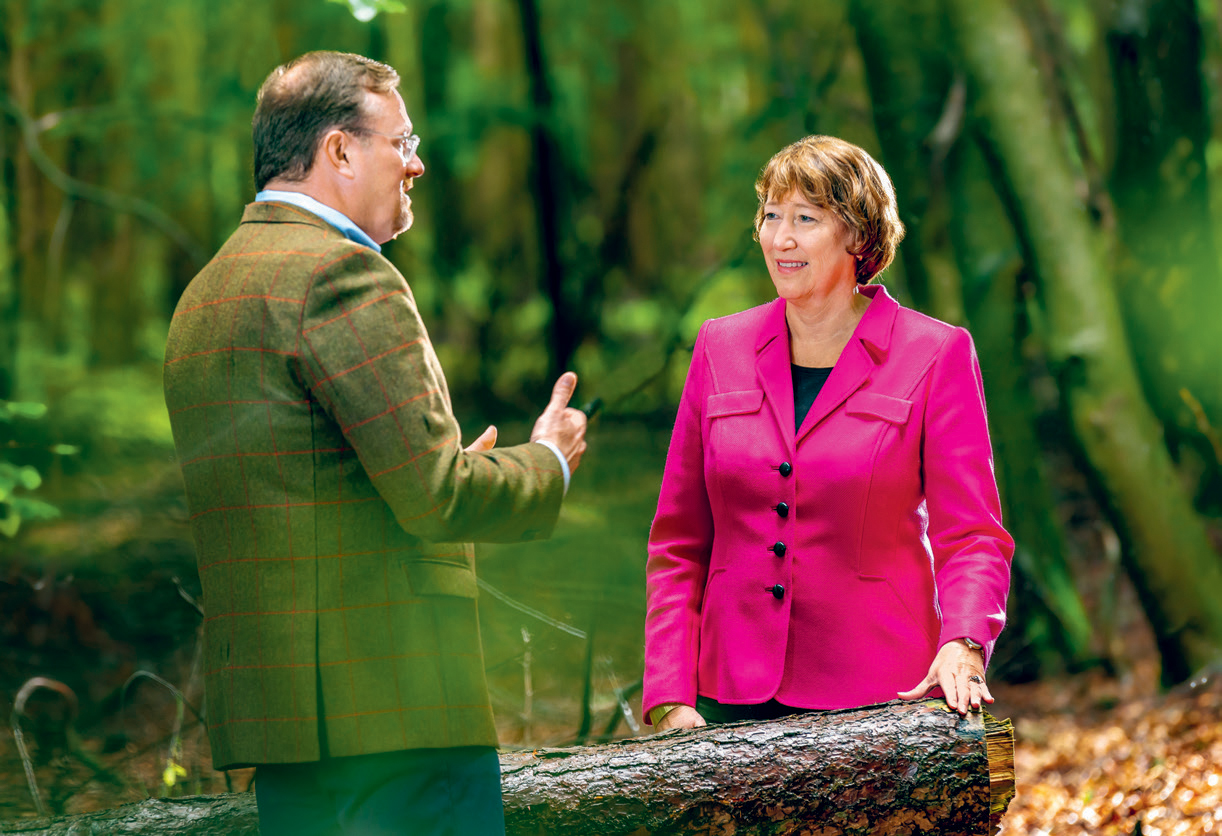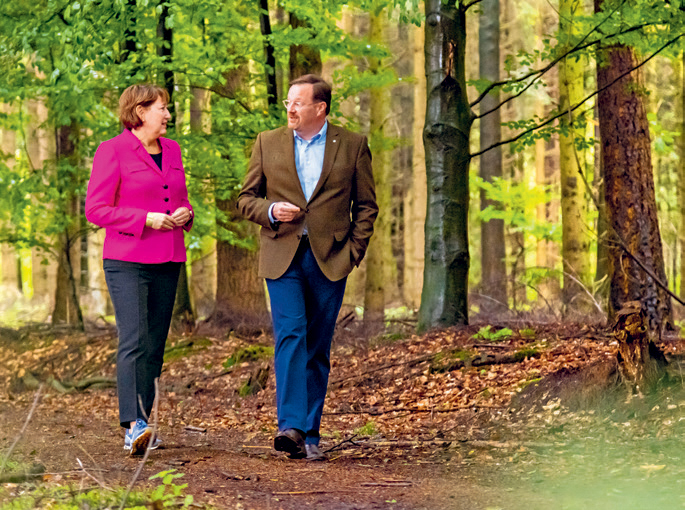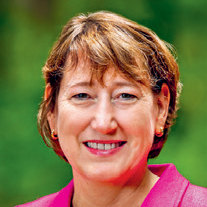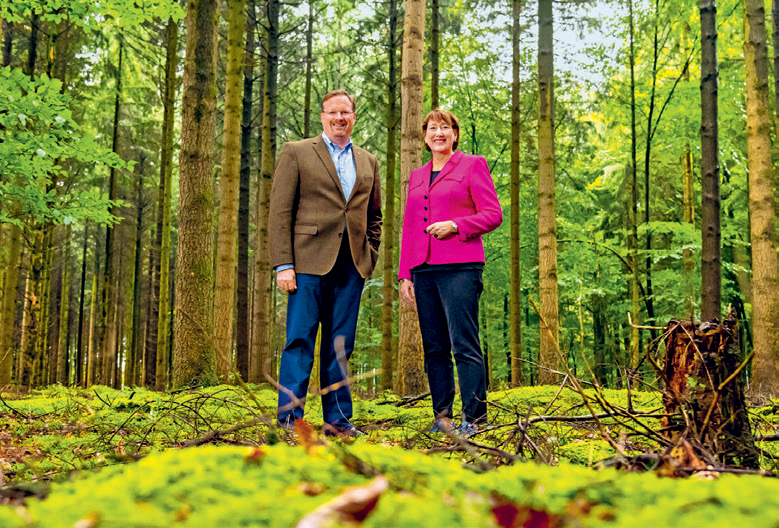
Bernard Krone: Dear Ms Müller, thank you for taking the time to talk to us – in your old home country! You were born about 70 kilometres away from our location, in Rheine. We are here in the midst of nature, in a very beautiful forest. The summer of 2021, with its extreme weather events and a flood disaster in Germany, showed us quite clearly how vulnerable the environment is. Against this background, too, the demands on mobility are growing ever stronger: It should be clean, quiet, efficient and climate-neutral. Ms Müller, how do you think the automotive industry can help to achieve this?
Hildegard Müller: I, too, would like to thank you for inviting me to this meeting and I am glad that we are walking this beautiful path together. These are indeed big tasks we are facing as an industry. Above all, the goal of climate neutrality demands a lot from the automotive industry. But we can build on one great strength: our innovative power. We have always proven that we put new ideas into motion, and we will continue to do so in the future. In doing so, we think beyond the car and look at how we can better interconnect the individual modes of transport and thus achieve more efficient transport. However, individual mobility will remain important in the future. As an automotive industry, we are convinced that it is necessary to take into account what mobility needs people actually have. Being close to people and their needs – whether they live in cities or in rural areas – that will be crucial. Incidentally, this applies just as much to road freight transport. I am certain that we can also become climate-neutral with individual mobility and with the car. Commercial vehicles, trailers and bodies will make their contribution. Medium-sized companies like Krone are very committed to this.
Hildegard Müller: I, too, would like to thank you for inviting me to this meeting and I am glad that we are walking this beautiful path together. These are indeed big tasks we are facing as an industry. Above all, the goal of climate neutrality demands a lot from the automotive industry. But we can build on one great strength: our innovative power. We have always proven that we put new ideas into motion, and we will continue to do so in the future. In doing so, we think beyond the car and look at how we can better interconnect the individual modes of transport and thus achieve more efficient transport. However, individual mobility will remain important in the future. As an automotive industry, we are convinced that it is necessary to take into account what mobility needs people actually have. Being close to people and their needs – whether they live in cities or in rural areas – that will be crucial. Incidentally, this applies just as much to road freight transport. I am certain that we can also become climate-neutral with individual mobility and with the car. Commercial vehicles, trailers and bodies will make their contribution. Medium-sized companies like Krone are very committed to this.

B.K.: Indeed. On the one hand, we are continuously optimising our environmental management approach. This includes, among other things, the consumption of materials and resources and the topic of recycling. For us, climate neutrality also means reducing energy consumption in our production. For example, our paint shop has been operated for many years with a combined heat and power plant that reduces CO2 production. The cathodic dip painting plant installed in our modern surface centre in Werlte is also state-of-the-art in terms of energy efficiency. The German Energy Agency has named it a lighthouse project for the reduction of waste heat. Another example of our contribution to climate neutrality is that we use renewable energies: Large photovoltaic systems have been installed on the roofs at our sites in Lübtheen and Herzlake. They also have a positive influence on our energy balance. In addition, we are increasingly relying on digital solutions in our products and services to enable our customers to be more efficient and cost-effective. I am a firm believer that digitisation will also further strengthen climate protection and the innovative power of the German economy.
H.M.: I see it the same way as you. Digitisation is and will remain a very big driver of the future, bringing us not only more growth, more freedom and more security, but also more climate protection. However, we as an association see a great need for political action so that innovative solutions can also be implemented. For example, we would like to see digitally optimised traffic management in cities that can reduce congestion and speed up routes. We are also aiming for autonomously driving shuttles in the city and in the countryside, as well as new assistance systems. If we intelligently link the individual modes of transport, this can make everyday life much easier for users. However, all of this requires a faster expansion of the digital infrastructure, especially for 5G, and a faster implementation of the framework conditions for autonomous driving. Where do you stand with your company in terms of digitisation, and how much potential does it still have for you?
“Climate protection is a task that we as the human race must shoulder together, and to which we must all contribute.”
Hildegard Müller
B.K.: When I look back on the previous year, the focus for us was, of course, on internal digitisation on the one hand – both in terms of business processes and supporting the people who work for us. We were able to implement “working from home” solutions and the establishment of flexible working hours well; we have invested a lot in IT here in order to meet the security requirements offered. On the other hand, when I look at our products, digitisation plays an important role both in the agricultural machinery we manufacture and in our commercial vehicles. The vehicles themselves are digitally monitored to ensure their permanent, fault-free function. In addition, the data enables so-called Predictive Maintenance. And, of course, you can see what happens to the goods during transport on board, for example, whether the necessary temperatures are maintained. Thirdly, we can optimise the utilisation of vehicles with our digital solutions. This, too, pays dividends in our pursuit of climate neutrality. After all, the automotive industry supports the EU Commission's goal of making Europe the first climate-neutral continent by 2050.
H.M.: Absolutely! Climate protection is a task that we as humanity must face up to and to which we must all contribute. Our member companies are investing over 150 billion euros in climate-neutral drives, electromobility and the digitalisation of transport by 2025. German manufacturers already have more than 50 per cent of the European market for electric cars. This makes them European champions in electromobility! And there are also fixed targets for commercial vehicles. We remain convinced that, in the long term, we need a technology mix of electric drive, hydrogen and e-fuels to achieve climate neutrality in transport. This applies to passenger cars, as well as commercial vehicles. The modern and clean combustion engine also makes its contribution. Even before the Commission's proposals, however, it was clear to us: Especially in the passenger car sector, the rapid ramp-up of electromobility is a priority. This is also where we – as the automotive industry – have delivered in recent years: Customers can already choose from more than 70 e-models from German manufacturers – by the end of 2023, there will be almost 150. But the lack of charging infrastructure in Europe is a real burden on success. 69 per cent of the charging points are located in just three countries: Germany, France and the Netherlands. And a corresponding infrastructure for commercial vehicles hardly exists yet. The VDA is very committed to ensuring that this issue is finally dealt with in a committed manner in politics. The Commission is now proposing a set of binding regulations for an expansion – we see this as a positive sign. Nevertheless, the targets still fall well short of what would be required for nationwide coverage. And for electromobility to develop its full potential, we need 100 per cent green electricity. I see that you offer an electric refrigerated semi-trailer – that's very exciting. How do you implement this from a technical standpoint?

B.K.: With our Krone Cool Liner THT, the cooling unit is operated purely electrically: A battery pack is installed in the vehicle that is charged via recuperation – an axle generator charges the battery with the energy from braking. This saves a lot of diesel fuel, which is still used as standard for transport refrigeration units.
H.M.: Impressive! I think that soon the CO2 certification of superstructures will become mandatory. Accordingly, new innovative ideas for optimising trailers must be quickly enabled and also promoted. Are there other projects under your roof that are moving in this direction?
B.K.: In addition to the use of recuperation, fuel consumption can be reduced, for example, through aerodynamically-designed parts on the trailer: Here we offer packages with side trim or rear diffuser that measurably reduce drag.
H.M.: In future, support programmes for commercial vehicles should take all vehicles and components into account. This also means that longer-term funding programmes for trailer technologies or the electrical auxiliary units on superstructures they mention must be realised. The restrictions in Europe that apply to commercial vehicles in terms of mass and dimension should be revised. They must be aligned with the potential they have for CO2 reduction. And if it is politically desirable to shift more goods to rail, the processes and prices in combined transport must also be adjusted accordingly.
HILDEGARD MÜLLER

President of the German
Association of the Automotive Industry
Before Hildegard Müller became President of the VDA in 2020, she was responsible for the Grid, Infrastructure and Digitisation division on the board of the energy supplier Innogy SE.
B.K.: Allow me to make the following comment: Since it is not at entirely possible to transfer all goods from road to rail, we must continue to optimise road transport, and there should be an open-system discussion about which routes are the right ones here. Of course, we would like to see this not only discussed, but also implemented – especially in the short term, so that we as an industry can muster even more courage to test innovative solutions.
H.M.: I agree with you completely. Are there other points in which politics should support you as an SME? What do you want from the decision-makers?
B.K.: Above all, reliability. And that entrepreneurship is not punished but promoted because it secures jobs, and helps to maintain Germany as a business location. With regard to our products, it would be desirable that concepts such as the long vehicle combination or weight and length measurements in general are openly discussed and not prevented by political restrictions. Ms Müller, what do you have on your agenda – what do you think it will take in the coming years to achieve the goals you have mentioned?
H.M.: The climate-neutral mobility of the future is an ambitious project that industry, politics and society can only implement together. When it comes to climate protection, the clock is ticking and we have to act – we know that and that is what we are going to do. But whoever has the most committed climate goals worldwide also needs the best location conditions. Unfortunately, we are becoming increasingly removed from this, and this is a great burden on those small and medium-sized businesses that are so committed, in particular. We also need a policy that is focused on the needs of consumers – whether in cities or rural areas. What we don't need are specifications regarding technologies. Rather, innovations should be promoted. They are the most efficient way to achieve climate neutrality by 2050 and to master the balancing act between climate protection, economy and social compatibility.

Photos: Schöning Photo Design




